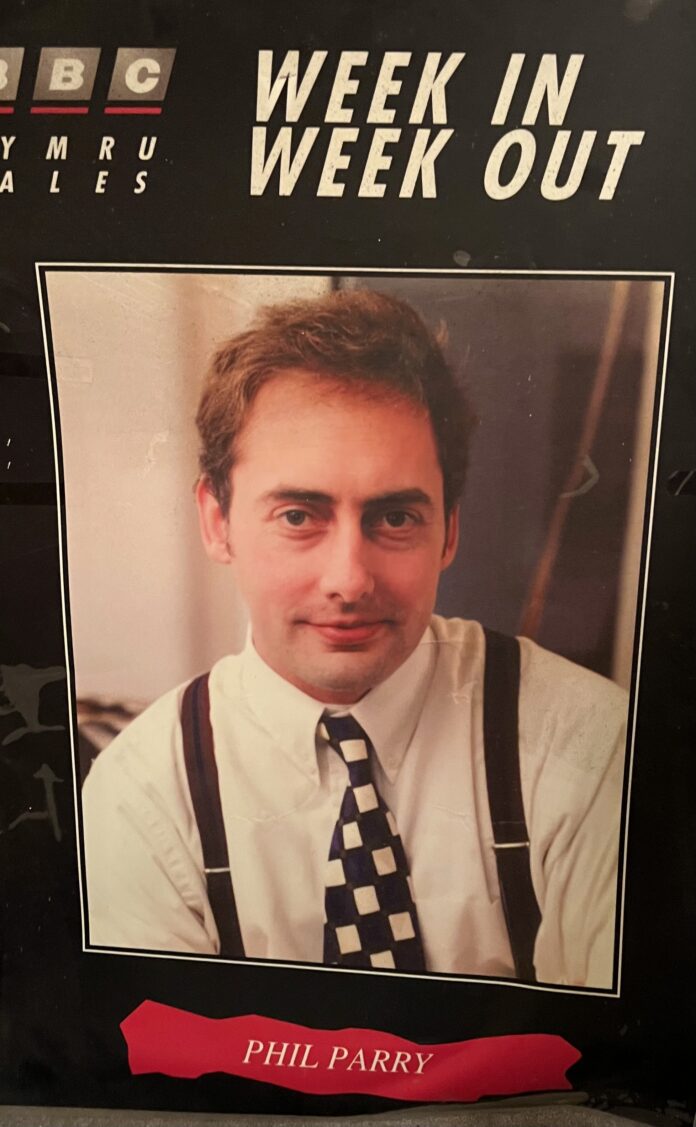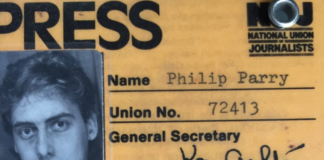- Jobs for the boys and girls - 21st January 2026
- Huwge mistake with public money… - 20th January 2026
- Green with envy… - 19th January 2026

Our Editor, Welshman Phil Parry, spent 23 years with the BBC, so he has been left reeling by the shocking events of the last few weeks – as it plays into the hands of those who are traditionally opposed to the corporation.
You never ever misleadingly edit a recording of a figure’s speech, but let’s keep this in perspective.
The BBC is a GOOD THING!
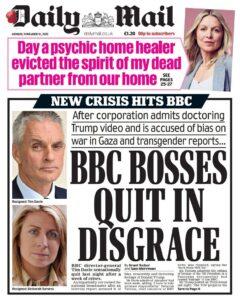 As someone who spent more than two decades at the corporation, in television, radio, and online, both in Cardiff and London, I understand these two crucial points better than most.
As someone who spent more than two decades at the corporation, in television, radio, and online, both in Cardiff and London, I understand these two crucial points better than most.
A terrible mistake was made and the beleaguered head of the BBC Tim Davie (who has faced a string of scandals) had to resign. Both he and the Chief Executive Officer (CEO) of News Deborah Turness were forced to quit.
It is no secret that well before the edit controversy we on The Eye had been calling for Mr Davie to go, because of the enormous damage caused to his organisation while he has led it by the terrible scandals. The real tragedy of this latest error, though, is that it is fodder for those who don’t like the BBC anyway.
 Here, for example, is the Mail on Sunday (MoS) recently: “For days now the BBC’s many Left-wing friends and favourites have been flooding onto the airwaves to defend the corporation.
Here, for example, is the Mail on Sunday (MoS) recently: “For days now the BBC’s many Left-wing friends and favourites have been flooding onto the airwaves to defend the corporation.
“They have declared that it is absolutely not biased, and is a treasure of impartiality. All serious people, including the BBC’s own High Command, know perfectly well that this is not true.
“Some of them have even explained why – its narrow, self-perpetuating recruiting base which instinctively repels and rejects conservatives

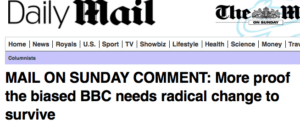 “…can this tottering giant be granted another Royal Charter at the end of 2027, without having to accept a far more explicit and stringent agreement on its duties to the paying public?”.
“…can this tottering giant be granted another Royal Charter at the end of 2027, without having to accept a far more explicit and stringent agreement on its duties to the paying public?”.
Its sister paper the Daily Mail proclaimed gleefully after it all broke: “…the scandal-hit broadcaster was this week plunged into a fresh crisis after an internal dossier exposed a string of incidents that demonstrate serious apparent bias in the Corporation’s reporting”.
Even fair-minded and independent news outlets have been left uneasy by what has happened.

The Reuters Institute for the Study of Journalism stated:“The challenges facing the BBC include:
- Intense scrutiny for its coverage of Brexit, domestic politics, and more, with frequent allegations of bias.
- Internal issues over gender pay gaps, coverage of controversial issues like climate change and racism, and disagreements over where the lines of due impartiality should be drawn.
- Discussions about the current funding model.
- A dramatic, ongoing disruption of the entire media sector as audiences embrace digital-, mobile-, and platform-dominated media environment where international commercial competitors like Facebook, Google, and Netflix play a more important role. Many domestic media face strong commercial headwinds as they face far more intense competition for attention, consumer spending, and advertising.”
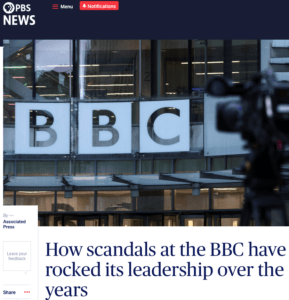 Here is the reaction of the agency Associated Press (AP) in its ‘PBS NEWS’: “The scandal leading to (the) resignations is hardly the first controversy to hit Britain’s publicly funded broadcaster — or to topple one of its leaders…
Here is the reaction of the agency Associated Press (AP) in its ‘PBS NEWS’: “The scandal leading to (the) resignations is hardly the first controversy to hit Britain’s publicly funded broadcaster — or to topple one of its leaders…
“BBC Director-General Tim Davie’s watch
“2021: Davie apologized after a report found that Martin Bashir had used fake bank records to deceive Princess Diana’s brother to land his explosive interview with her in 1995. Davie, who was not at the BBC at the time, offered a full and unconditional apology, along with written apologies to then-Prince Charles and his sons, Prince William and Prince Harry.
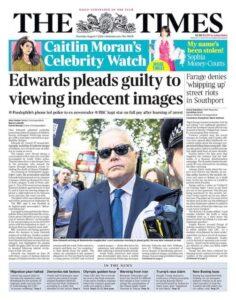 “July 2023: Huw Edwards, the highest paid news anchor, was suspended with full pay over allegations he paid a teen for sexually explicit photos. He later pleaded guilty and was given a suspended prison sentence for having unrelated images of child sexual abuse on his phone.”
“July 2023: Huw Edwards, the highest paid news anchor, was suspended with full pay over allegations he paid a teen for sexually explicit photos. He later pleaded guilty and was given a suspended prison sentence for having unrelated images of child sexual abuse on his phone.”
The report went on to list the appalling scandals that have rocked the BBC under Mr Davie’s leadership.
The Economist has outlined the importance of the broadcaster, but also declared: ‘Mr Davie’s resignation followed a run of missteps. In September the BBC’s complaints unit ruled that the corporation had broken editorial guidelines by broadcasting a performance at Glastonbury music festival which included chants of “Death to the IDF”, Israel’s army. In October Ofcom, the broadcasting regulator, ruled that the BBC had committed a “serious breach” of rules by failing to acknowledge that the narrator of a documentary about Gaza was the son of a Hamas official.’

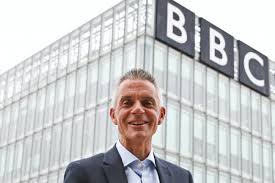
It is clear that Mr Davie had hung on for too long (one publication described him as “Teflon Tim”), it seems, though, that taking disciplinary action earlier against him was tempered by the knowledge that there were few alternatives, but the decision was taken out of the hands of senior officials
The Chair of the Culture, Media and Sport (CMS) committee Dame Caroline Dinenage, proclaimed in the wake of the resignations, that they were “avoidable”.
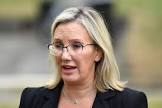
She said: “…there is no escaping the fact he (Tim Davie) was very slow to act on this particular issue”.
As possibly Dame Caroline has alluded to here, he and his lieutenants had known about this mistake in editing for months, but, as far as we understand, DID NOTHING ABOUT IT hoping, perhaps, that it would all go away.
From this it is obvious that the BBC’s entire media operation needs to be looked at, because as someone who has been a journalist for many years I could have told them this would happen.

Embarrassing facts NEVER go away. They are ALWAYS leaked to papers like the Daily Mail or Daily Telegraph.
Quite apart from this case, their astonishing silence can also be seen in their reaction to our questions about the awful scandals recently.
This is the (extremely polite) request I put to their Media Office (MO) on December 19, and I was encouraged because on the BBC’s website it is declared: “Enquiries from journalists will be responded to as quickly as possible”.

Hello.
I am Editor of a news website called The Eye.
Could you please answer the following questions:
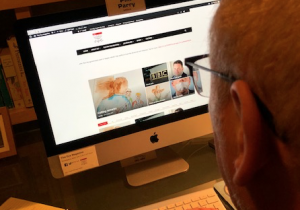
1. In the light of the Gregg Wallace, and other affairs, what, if any, programmes are now not to be transmitted, and how many of them are there?
2. What, if any, changes have been made to your Whistleblowers’ Charter, and what are the dates of these?
3. What, if any, changes have been made to your safeguarding policies, and what are the dates of these?
Statements can be made by return to this address – it is checked constantly and is totally secure.

Thank you,
Phil Parry
To date, though, there has been NO reply apart from two automated messages saying that the requests had been received.
It appears there had been a rift between the BBC board and the news division with some arguing the corporation has, for too long, failed to address institutional bias. and others questioning whether what’s unfolded has been an orchestrated – and politicised – campaign against the organisation which has claimed two big scalps.

The BBC allowed the story to fester – and the White House called the scene in the programme at the heart of it all “fake news”.
The US president himself weighed into the debate saying in a post on his Truth Social platform, that he celebrated the resignations and accused the BBC of “doctoring” his speech as well as of “trying to step on the scales of a presidential election”.
At a board meeting on Thursday to discuss the growing crisis Ms Turness was apparently “ripped apart“.
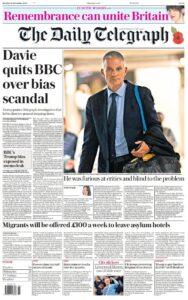 The background to all of this is extraordinary, because former Prime Minister (PM) Boris Johnson had unleashed a furious tirade against the BBC, in which he had also slammed two veteran presenters, while demanding Mr Davie‘s resignation.
The background to all of this is extraordinary, because former Prime Minister (PM) Boris Johnson had unleashed a furious tirade against the BBC, in which he had also slammed two veteran presenters, while demanding Mr Davie‘s resignation.
So let’s look a bit more closely at what occurred under Mr Davie.
An edition of Panorama, aired last year and made by an independent production company, featured spliced together clips of a speech by President Trump given on January 6 2021, which suggested that he told the crowd: “We’re going to walk down to the Capitol and I’ll be there with you, and we fight. We fight like hell”.
Yet he had said no such thing: the programme-makers had stitched together the incendiary statement from two unrelated remarks.
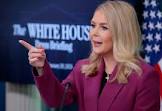
After the Daily Telegraph published a memo from a whistleblower within the BBC on November 3, the White House press secretary, Karoline Leavitt, called the BBC “100 per cent fake news”.
The next day Mr Davie stepped down, and Mr Trump claimed victory, posting that “The TOP people in the BBC…are all quitting/FIRED, because they were caught ‘doctoring’ my very good (PERFECT!) speech“.
Worries have been raised in the past, too, about the corporation’s impartiality, despite Mr Davie declaring in Cardiff soon after his appointment: “If you want to be an opinionated columnist or partisan campaigner on social media then that is a valid choice, but you should not be working at the BBC”.
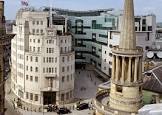
BBC rules underline this, and announce that staff should also avoid using disclaimers such as ‘My views, not the BBC’s’ in their biographies and profiles, as they provide no defence against personal expressions of opinion.
But institutional left-wing bias there is NOT.
An atrocious mistake was made, but by and large we are better off WITH the BBC than WITHOUT it…

The memories of Welshman Phil’s astonishing decades long award-winning career in journalism (including his years at the BBC), as he was gripped by the rare neurological disabling condition Hereditary Spastic Paraplegia (HSP), have been released in the book ‘A Good Story’. Order it now.
Tomorrow – how during that career, he has always been lucky enough to work in a largely free environment, but this is not so in other countries, and new evidence is emerging today of a fierce crackdown on opposition politicians as well as journalists in one of them – Georgia.









